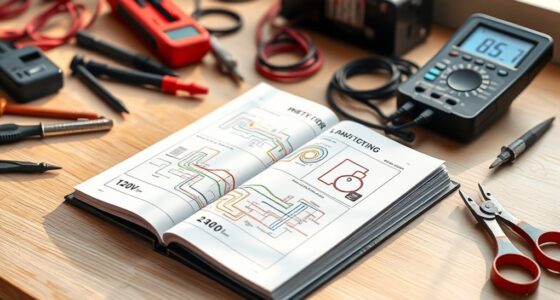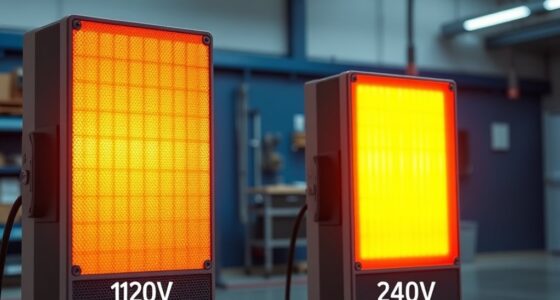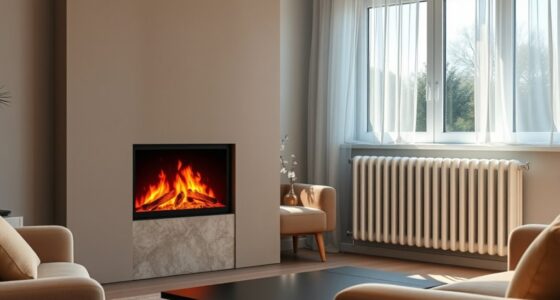Believing common myths about space heaters can lead you to waste energy and face unexpected bills. Overestimating their efficiency, improper placement, or ignoring safety features causes higher costs and risks. Using the right size heater, setting thermostats properly, and following safety tips help save money and prevent hazards. If you want to uncover how to avoid these pitfalls, you’ll find practical strategies to use space heaters wisely by exploring further.
Key Takeaways
- Misconceptions about high energy use lead to unnecessary heater avoidance, increasing overall heating costs in the long run.
- Overestimating heater size or improper placement causes energy waste and higher utility bills.
- Ignoring safety features and electrical capacity risks costly accidents and damage, increasing hidden expenses.
- Relying solely on space heaters without insulation or zone heating can significantly raise energy costs.
- Failing to use programmable thermostats and energy-efficient models results in higher consumption and hidden operational costs.
Common Energy Myths About Space Heaters Debunked
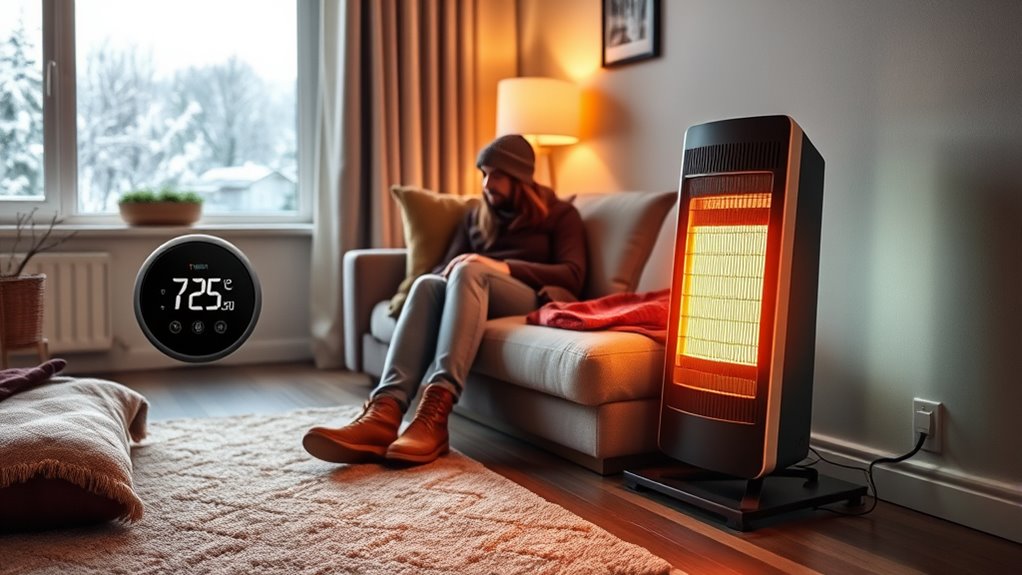
Many people believe that space heaters are incredibly energy-consuming and will drastically hike your electricity bill. This is a common myth that often leads to unnecessary hesitations about using them. To correct this misconception, understanding the actual cost calculation is essential. Space heaters can be energy-efficient if used correctly, especially when heating small areas. The myth correction involves recognizing that they don’t always considerably increase your energy costs if you operate them wisely—like setting the thermostat properly and using timers. The key is to avoid overestimating their energy use based on general assumptions. Instead, focus on real data, measure your actual consumption, and compare it with your overall utility costs. This way, you can make informed decisions without falling for common energy myths about space heaters. Properly understanding energy efficiency can help you optimize usage and reduce unnecessary expenses.
Understanding the True Costs of Using Space Heaters
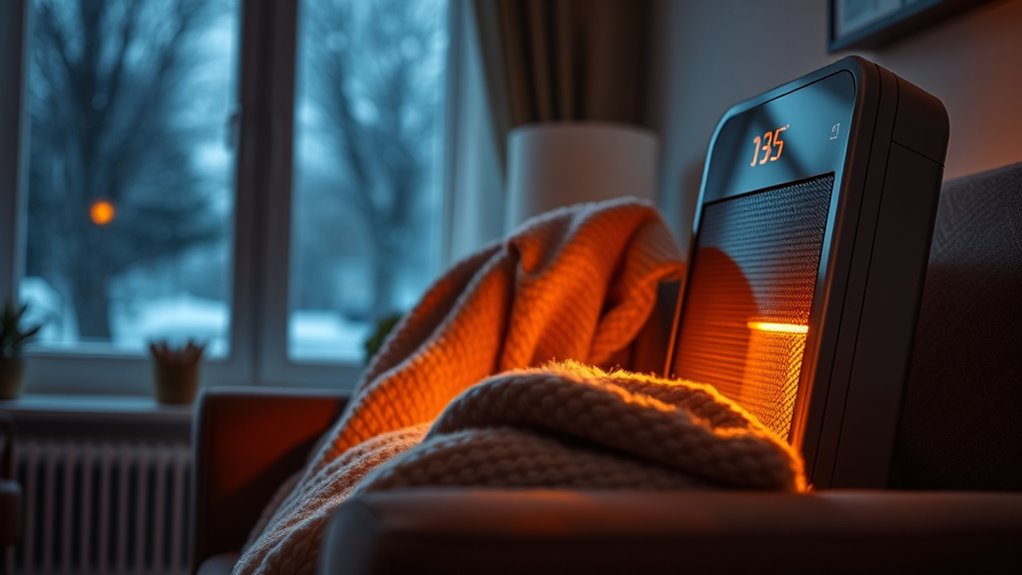
Understanding the true costs of using space heaters helps you make smarter choices for your home. You’ll see how energy consumption impacts your bills and uncover hidden expenses that add up over time. Exploring cost-effective alternatives can save you money and keep your space comfortable without breaking the bank. Being aware of privacy policies and how your data is managed ensures a transparent and secure browsing experience.
Energy Consumption Insights
While space heaters can provide quick warmth, their energy consumption often surprises users with high electricity costs. To understand the true costs, focus on key insights:
- Wattage and Usage: Higher wattage heaters consume more energy. Using them only when needed maximizes energy savings.
- Size Matters: Smaller heaters or zone heating can reduce overall power use by targeting specific areas.
- Smart Power Management: Setting timers and adjusting thermostats helps prevent unnecessary energy drain.
Hidden Expense Risks
Although space heaters are convenient for quick warmth, they can secretly rack up significant costs if you’re not careful. Hidden costs often go unnoticed, but they add up over time. For example, running a space heater continuously can lead to high energy bills, exposing you to expense risks you might not anticipate. Many overlook the increased electricity consumption and the potential strain on your electrical system, which can cause safety issues or even damage. Additionally, using space heaters in poorly insulated spaces can lead to wasted energy, further inflating costs. These hidden expenses can strain your budget, especially if you rely on space heaters frequently. Being aware of these hidden costs helps you make smarter choices, avoiding unnecessary expense risks and managing your energy use more effectively. Recognizing the importance of electrical safety can prevent accidents and costly repairs related to electrical overloads or malfunctions.
Cost-Effective Alternatives
If you want to save money on heating, exploring cost-effective alternatives to space heaters can make a big difference. Start with energy-efficient upgrades like programmable thermostats to better control your heat. Consider insulation improvements—adding weatherstripping or sealing leaks—to keep warm air inside. These upgrades reduce your reliance on space heaters and lower energy bills. Additionally, focus on these options:
- Upgrade your windows or install thermal curtains for better insulation.
- Use zone heating by heating only occupied rooms.
- Invest in a whole-house heat pump for efficient, consistent warmth.
- Be aware of the signs of spoilage in lemon juice to avoid using spoiled ingredients and wasting money.
How Inefficient Use Can Drive Up Your Electricity Bills

Using a space heater inefficiently can substantially inflate your electricity bills. When you leave it running in unoccupied rooms or set the thermostat too high, you waste energy that doesn’t improve comfort. This energy waste leads to higher electricity consumption, directly increasing your costs. Additionally, poor usage habits can cause electricity spikes, sudden surges in power that strain your system and raise your bills further. For example, turning the heater on at maximum setting without proper insulation causes unnecessary energy drain. To avoid these issues, use your space heater wisely: set it to the lowest comfortable temperature, only heat occupied spaces, and turn it off when not needed. Smart usage prevents energy waste and keeps your electricity bills more manageable. Remember, embracing creative practice and developing mindful habits can help foster better energy management in all areas of life.
Safety Hazards Linked to Misusing Space Heaters
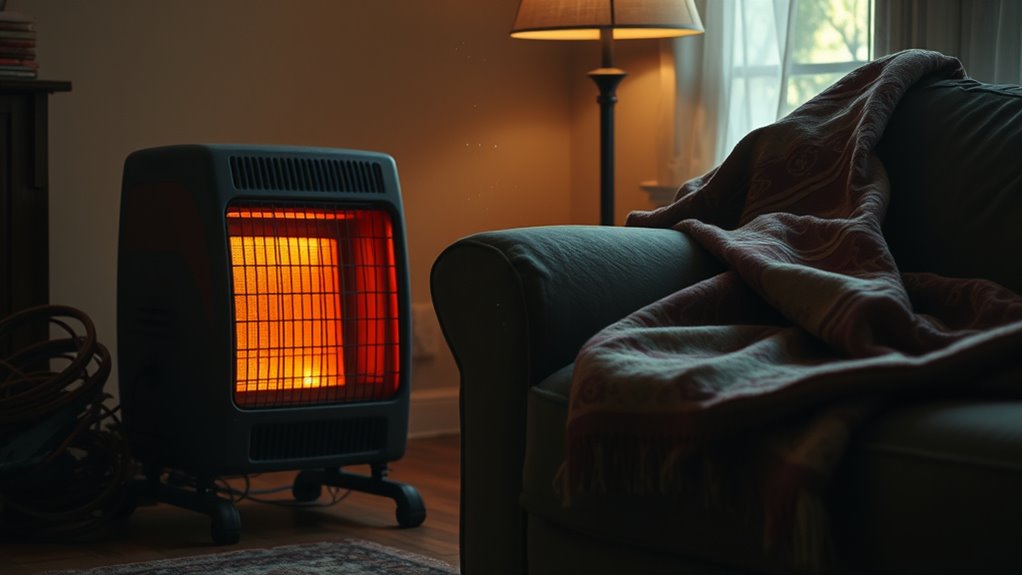
Misusing space heaters can lead to serious safety hazards you should never ignore. Overloading outlets increases the risk of fires, while placing heaters near furniture or curtains can cause them to overheat. Additionally, tip-over accidents can quickly turn dangerous if your heater isn’t properly stabilized. Choosing the right dog names can also reflect your pet’s personality and breed traits, helping ensure a good fit.
Fire Risk From Overloading
Overloading a space heater by plugging it into an extension cord or multiple devices into the same outlet considerably increases the risk of fire. This creates a fire hazard because the electrical circuit becomes overwhelmed, heightening the overload risk. To stay safe, avoid these common mistakes:
- Never connect a space heater to an extension cord; use a dedicated wall outlet instead.
- Do not plug multiple high-wattage devices into the same outlet or power strip.
- Regularly check your outlets and cords for signs of wear or overheating.
Additionally, understanding the home electrical system and its capacity can help prevent overloads and ensure safe usage of space heaters.
Tip-Over Hazards
Tip-over hazards pose a serious safety risk if space heaters are not used properly. When stability concerns are ignored, the heater can tip over easily, causing burns or fires. To minimize this risk, choose heaters with a low center of gravity and sturdy bases. Always place them on flat, stable surfaces and keep them away from furniture, curtains, or clutter. Use the following tips to prevent tip-over hazards:
| Tip | Why it matters | How to implement |
|---|---|---|
| Secure heaters | Prevent accidental tipping | Use anti-tip anchors or straps |
| Keep clear surroundings | Reduce obstruction risks | Maintain a 3-foot clearance zone |
| Regular inspections | Identify stability concerns | Check for loose parts or uneven bases |
Prioritize stability concerns to keep your home safe from preventable accidents. Additionally, understanding projector technology can help you make safer choices when setting up home entertainment systems.
The Impact of Space Heater Placement and Size on Efficiency
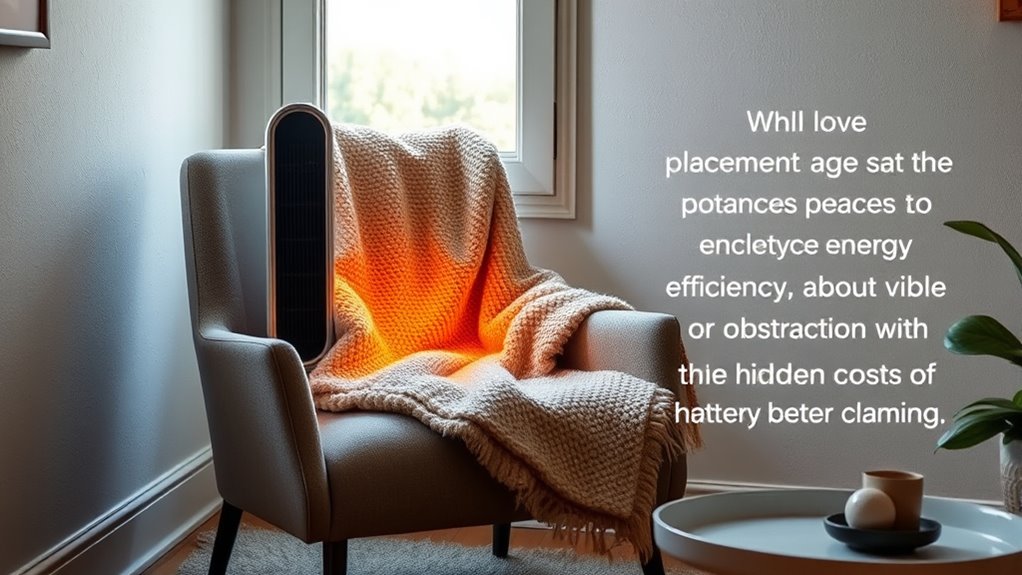
The placement and size of your space heater directly influence its efficiency and effectiveness. Poor Heater Placement can cause uneven heating and higher energy use. To maximize efficiency, consider these tips:
- Choose the right spot: Place your heater where it won’t be obstructed, ideally near the area you want to warm.
- Size Optimization: Select a heater that matches your room size. A too-small heater will struggle, while a too-large one wastes energy.
- Avoid drafts: Keep the heater away from windows or doors where drafts can decrease its performance.
- Consider the type of heater: Different types of space heaters, such as Vetted Flat Iron Bike, have varying efficiencies depending on their placement and size, so choose accordingly.
Costly Mistakes: Overlooking Energy Ratings and Features
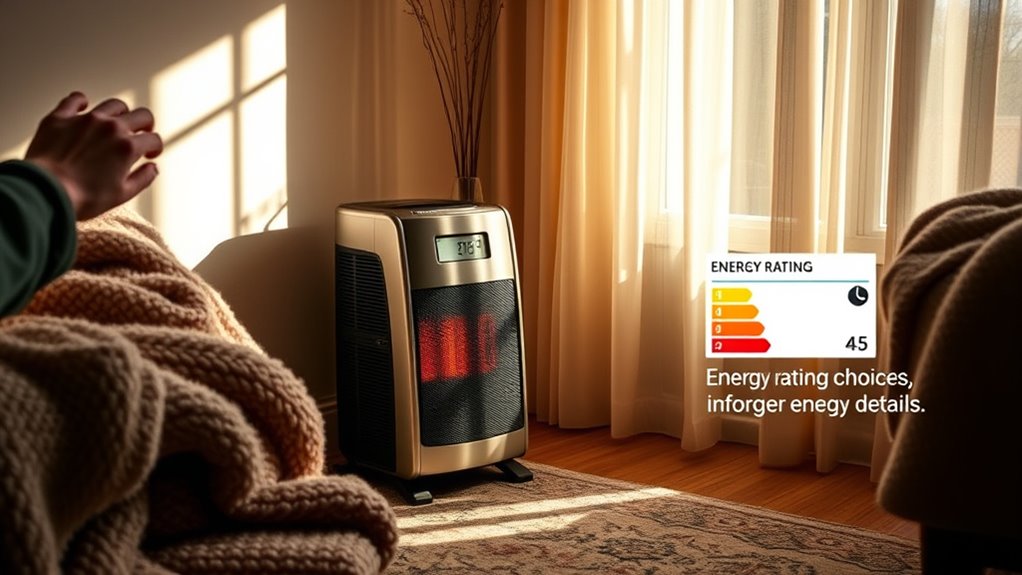
Choosing the right space heater isn’t just about size and placement; paying attention to energy ratings and feature considerations can save you money in the long run. Energy ratings, like the DOE efficiency standards or certifications, help you identify units that operate more efficiently, reducing energy waste. Ignoring these ratings might lead you to select a heater that consumes more power than necessary, inflating your electricity bills. Additionally, consider features like adjustable thermostats, timers, and safety shut-offs, which can enhance efficiency and safety. Overlooking these features means missing out on ways to optimize performance and save energy. By focusing on energy ratings and relevant features, you ensure your space heater is both cost-effective and suited to your needs, preventing costly mistakes down the line. Understanding energy efficiency can help you make more informed choices and avoid unnecessary expenses.
Practical Tips for Safe and Cost-Effective Space Heater Use
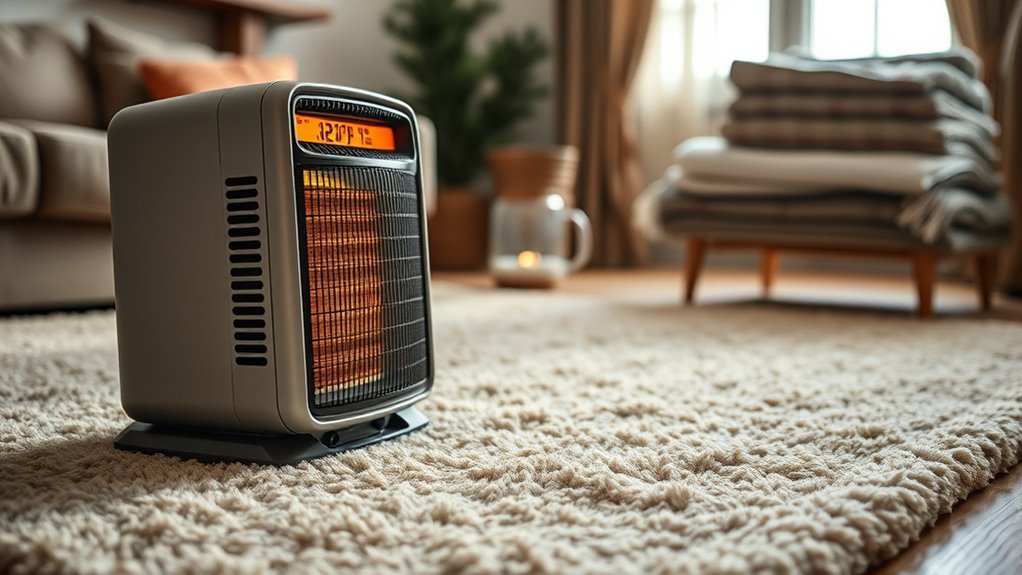
To maximize safety and save money, you should follow practical strategies when using space heaters. First, always keep the heater at a safe distance from furniture and curtains to prevent fire hazards. Second, use energy saving strategies like thermostat optimization—set your heater to the lowest comfortable temperature to reduce energy consumption. Third, regularly clean filters and vents to ensure efficient operation. These steps help you avoid unnecessary energy waste and lower utility bills. Additionally, consider using a programmable thermostat to maintain consistent warmth without overusing the heater. Remember, safety and efficiency go hand-in-hand, so never leave a space heater unattended or run it overnight. Following these tips ensures safe, cost-effective heating while maximizing your energy savings.
Alternatives to Space Heaters for Efficient Home Heating

While space heaters are convenient for targeted heating, exploring alternative methods can lead to more efficient and cost-effective solutions. Upgrading your thermostat control allows you to set precise temperatures, reducing energy waste. Additionally, insulation improvements—such as sealing leaks around windows and doors or adding attic insulation—keep warm air inside, minimizing heating needs. These strategies work together to create a more consistent indoor temperature without relying solely on space heaters. Using a programmable thermostat, for example, ensures your home stays warm when needed and cools down when not, saving energy and money. By focusing on insulation and smart thermostat control, you can heat your home more efficiently and avoid the hidden costs associated with space heater overuse.
Frequently Asked Questions
How Can I Identify Energy-Efficient Space Heaters?
You can identify energy-efficient space heaters by checking for energy efficiency labels like ENERGY STAR, which indicate better performance. Also, focus on heater size selection; choosing a unit that matches your room size prevents energy waste. Look for models with adjustable thermostats and safety features, as these help control energy use. By comparing labels and selecting appropriately sized heaters, you guarantee maximum efficiency and lower energy costs.
Are Programmable Thermostats Compatible With Space Heaters?
Yes, programmable thermostats are compatible with space heaters, especially those with thermostat compatibility features. You can often connect them for smart control, allowing you to set schedules and adjust temperatures remotely. Make sure to check your space heater’s specifications for thermostat compatibility, and choose a smart thermostat that supports your heater’s control system. This setup helps you save energy and maintain a comfortable environment efficiently.
What Maintenance Can Improve a Space Heater’s Efficiency?
Think of your space heater as a trusted steed needing care. Regularly clean or replace heater filters to guarantee ideal airflow, preventing overheating. Check the power cord for frays or damage, much like inspecting a sword before battle, to avoid safety hazards. Keeping these elements in top shape boosts efficiency, saves energy, and prolongs your heater’s lifespan. Stay vigilant, and your heater will serve you well through colder days.
How Do Insulation Levels Affect Space Heater Energy Costs?
Insulation levels considerably impact your space heater’s energy costs by acting as thermal barriers that retain heat. When your insulation is poor, your heater works harder, increasing energy consumption. Upgrading insulation minimizes heat loss, making your space warmer more efficiently. Proper insulation reduces the insulation impact on energy bills, helping you save money and maintain a cozy environment without overworking your heater.
Can Using Space Heaters Impact Overall Home Energy Savings?
Using space heaters can boost your home’s energy savings if you target specific rooms, much like focusing a flashlight instead of lighting up a whole room. They often cost less to operate than central heating, but you should compare costs and consider safety. Proper use can reduce your overall energy bills, yet ignoring safety considerations may lead to hazards, offsetting savings. Always choose energy-efficient models and follow safety guidelines for ideal benefits.
Conclusion
Now that you know the hidden costs and common pitfalls of space heaters, are you truly aware of how much your choices could be costing you? Misusing or ignoring safety and efficiency tips might seem harmless, but it can lead to unexpected expenses or hazards. Stay vigilant, make informed decisions, and remember—what you don’t see could be draining your wallet or risking your safety. The real savings—and safety—might depend on what you do next.


